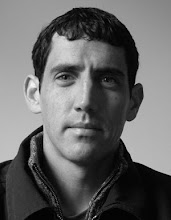This is an addendum to my last post on discovery and decision. As I read on in Janet Burroway's book Writing Fiction - yes, I personally drive the consumer market for books on writing - I came to a passage where she crystallized the idea of character (or dramatic character anyhow). She refers to "conflict that is the essence of character".
I was once warned away from thinking of stories in terms of the classic term conflict, because the word suggested something negative. But within the context of viewing stories as a cycles of discovery and decision, conflict seems apt because every decision involves conflicting choices. Otherwise, we are left with a bland tale indeed.
At the macro level, the antipodal positions of conflict have been used to categorize fiction: man vs. man; man vs. nature; man vs. self. (The best stories, of course, resolve back to the latter of the three, even it outwardly they present some version of the first two.)
At an even more abstract level the complication-resolution model also implies conflict. A complication introduces an imbalance in a character's life that can only be resolved - barring an act of God - by action on the part of the character, even if this action is completely internal, such as coming to peace with a situation.
The pitfall with using "conflict" in conceptualizing stories, as my teachers warned, is that the word connotes "aggression." Would could take this to mean "angry" or "violent," adjectives that apply to a limited number of characters.
In short, internal conflict seems like a good way to describe a state of mind of a post-discovery character who must make a decision - be it a decision that resolves a story's main complication or a decision that solves some minor disturbance. How the character acts at the moment of conflict tells us about her soul.
Wednesday, November 5, 2008
Subscribe to:
Post Comments (Atom)




4 comments:
That is one thing that I noticed in JK Rowling's Harry Potter books. Hardly a page went by without some small conflict (Harry and his enemies, Harry and his doubts, Harry and nameless forces, etc). Just as often we found some small resolution even if it was only in seeing how Harry would meet this conflict. We didn't need to know how it would turn out to see Harry's character developed for us by watching him meet these continual conflicts.
In that I think Rowling excels: she keeps before us a constant stream of visions of how Harry thinks and how Harry meets diversity. And in this she is able to create a very believable and lovable character who grows and changes in very subtle ways.
This is one thing that my attempts at fiction have utterly lacked. I worked too hard at working up to great moments of decision but neglected the many little moments that make a character actually live.
Think Bilbo Baggins. Little moments make him alive to us.
You can almost think about it as an experiment. A character has a hypothesis on the way the world works, some discovery puts that framework in question - i.e., complicates it. Throughout the course of the story the character makes discoveries and decisions, the way a scientists tackles a problem. Through that process comes change - and connection to the character. Then again it could just be the science writer in my talking.
I think that is an apt description.
Hey Chris,
I don't want to rush you, but I'm a bit curious what you have new to enlighten me with. I stop by each evening, hoping for some new brilliance, something new to chew on.
Post a Comment